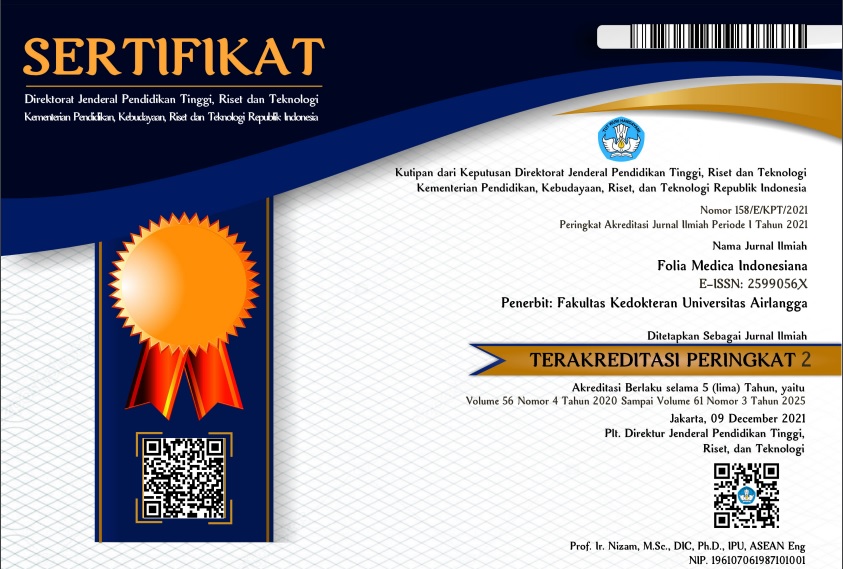ORCID ID
Magda Rosalina Hutagalung: https://orcid.org/0000-0002-6304-5009
Abstract
Highlights: • This research compared the hondroregenerative potential between bovine cartilage scaffold with platelet-rich fibrin (BCPRF) and autologous cartilage. • The formation of newly-regenerated chondrocyte, the thickness of type II collagen, and the rate of cartilage resorption following the subcutaneous implantation were assessed. • BCPRF is highly biocompatible and can be developed as an alternative to alloplastic porous polyethylene (Medpor) implant material. Abstract: The invention of alternative implants with regenerative potential comparable to autologous cartilage continues to be encouraged due to high morbidity of the donor site related to autologous harvesting process. This research attempted an invention of alternative implant using tissue engineering techniques in the form of endogenous regeneration by combining decellularized bovine cartilage scaffold with platelet-rich fibrin (BCPRF) that was implanted subcutaneously. The study aimed to compare the chondroregenerative potential between BCPRF and autologous cartilage in terms of the formation of newly-regenerated chondrocyte, the thickness of type II collagen produced, and the rate of cartilage resorption following the subcutaneous implantation. This study was conducted in a pretest-posttest control group design using New Zealand white rabbits. Forty-eight experimental samples were divided into two groups, then treated with subcutaneous implantation of BCPRF and autologous cartilage respectively. The results were evaluated after six weeks of implantation. Thirty-nine samples were evaluated. There was a significant difference found from both groups in terms of the formation of newly-regenerated chondrocyte, the thickness of type II collagen (p=0.000), and the implant resorption rate (p=0.000). The microscopic images demonstrated a superior chondroregenerative potential in the group receiving implantation of autologous cartilage compared to the group receiving BCPRF. The chondroregenerative potential for autologous cartilage and BCPRF differed significantly in terms of the formation of newly-regenerated chondrocyte, the deposition of type II collagen matrix, as well as the resorption rate.
Keywords
Autologous cartilage, platelet-rich fibrin, bovine scaffold, chondrocyte regeneration, medicine
First Page
305
Last Page
312
DOI
10.20473/fmi.v58i4.16499
Publication Date
12-5-2022
Recommended Citation
Widyatmika, Putu Ardhy Parama; Noer, Muhammad Sjaifuddin; and Hutagalung, Magda Rosalina.
2022
Chondroregenerative Potential of Platelet-Rich Fibrin (PRF)-Impregnated Decelulrized Bovine Cartilage Scaffold Implanted Subcutaneously.
Folia Medica Indonesiana. 58,
4 (Nov. 2024 ), 305-312.
Available at: https://doi.org/10.20473/fmi.v58i4.16499






